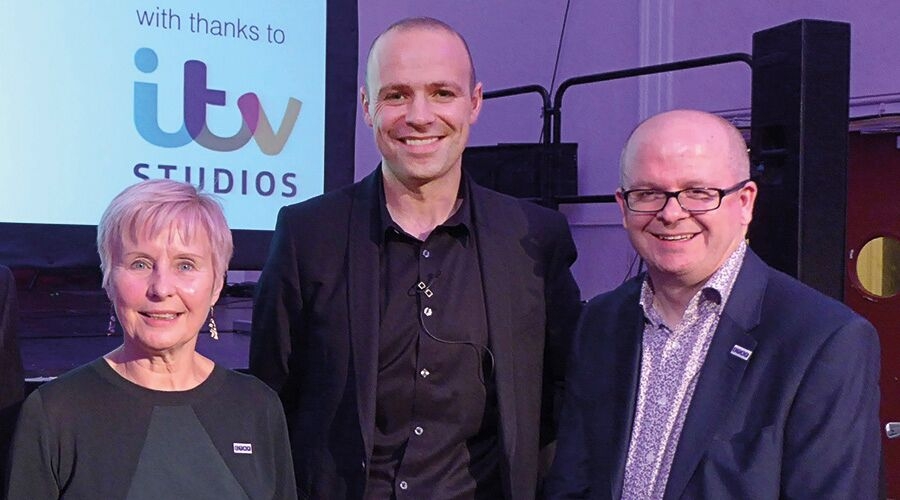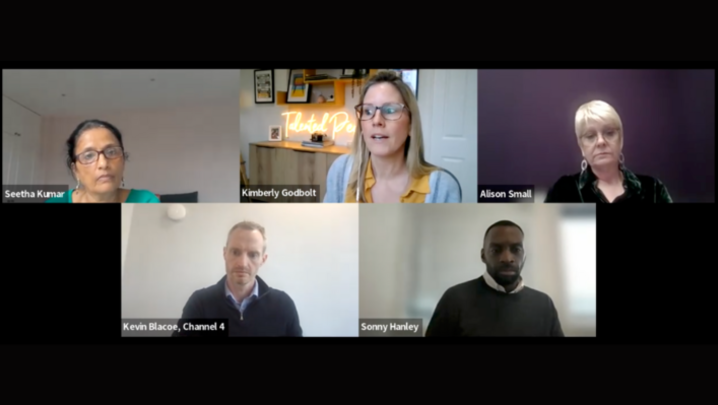Report of North East & The Border Centre event by Graeme Thompson
ITV expects its new multi-million-pound fantasy drama Beowulf to appeal to audiences too squeamish to watch HBO’s gory Game of Thrones. And it’s hoped that the franchise will build on the North East’s growing reputation as a drama production base.
ITV Studios MD Julian Bellamy predicted that the new 13-part action series, filmed in Weardale and on Tyneside, will also have the broader appeal of more mainstream shows, such as BBC One’s Merlin.
Bellamy was giving the annual North East & the Border lecture at Gateshead Old Town Hall, in association with the Cinema and Television Benevolent Fund, in mid-October. The fund was represented by Annie Hodgkiss and Paul Pirie.
At the event, he showed exclusive footage of Beowulf, which stars North-East actor Kieran Bew, William Hurt and a fearsome band of CGI trolls. The series is due to air in the new year.
“I expect it to compare favourably with shows such as Game of Thrones,” he said. “But it will be more accessible and not so extreme.
“Game of Thrones is estimated to have brought almost £90m directly and indirectly to the local Northern Irish economy. Doctor Who kick-started a film and media industry in Wales, which has seen a 52% increase in employment in the creative industries. Beowulf could do the same for the North East.”
ITV Studios is currently making two major dramas in the region: Beowulf and the Brenda Blethyn detective series, Vera, which is now screened in 131 countries. The company’s factual arm, Shiver, produces Tales from Northumberland with Robson Green.
ITV Studios is Europe’s biggest production company and Bellamy is keen to widen its talent pool and strike deals with scripted and non-scripted producers in regions such as the North East.
“We are expanding the pool of talent in the region, which has got to be good for everyone. Talent attracts talent and a cluster bomb of talent attracts commissions,” said the former Channel 4 executive. “That’s why we are open for all sorts of partnerships with all sorts of local indies and local talent.
“For ITV, regionality is increasingly seen as a key competitive advantage. In the past, it would have been just another thing to tick off on the ITV licence ‘to do’ list.”
Bellamy said that ITV Studios made around two-thirds of its drama outside London and the South East. Add in its soaps, Emmerdale and Coronation Street, and the figure increased to 92%
He argued that this level of activity proved that ITV was a more “accurate bellwether” of the health of regional production than the BBC. “The BBC had to do what it did [moving to Salford] and spend big in the regions to justify a licence fee raised from the whole of the UK. ITV doesn’t. ITV is now largely able to do what suits ITV commercially.
“The past few years have taught us that our bread doesn’t get buttered in London. The wellspring of what we do, the reason we connect with audiences, comes from ITV’s deep roots outside London. Obligation has morphed into opportunity.”
Taking questions from the audience, Bellamy admitted that broadcasters could do more to make it easier for producers facing the practical difficulties of being based far from London. But he said that the industry had woken up to the notion that, when it came to ideas and talent, the answer lay in “acting local and going global”.





